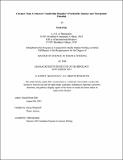Cheaper Than A Funeral: Considering Ibogaine’s Psychedelic Journey and Therapeutic Potential
Author(s)
Daly, Noah
DownloadThesis PDF (3.300Mb)
Advisor
Weintraub, Karen
Terms of use
Metadata
Show full item recordAbstract
The past decade has seen a surge of interest in psychedelic compounds as therapeutic medicine. Ibogaine, an indole alkaloid extracted exclusively from an endangered family of shrubs from Central African nations of Gabon and Cameroon, is a psychedelic currently being studied for its unique therapeutic potential. It is also considered the most extreme of the psychedelic drugs currently known to researchers. For the past fifty years, it’s been used to treat severe substance use disorders, particularly with highly addictive opioids and stimulants. In the past ten years, American special operations forces veterans have begun to take ibogaine to treat traumatic brain injuries (TBI). Anecdotal evidence has suggested that the permanent, downstream symptoms TBI patients experience after these injuries are effectively managed after a single ibogaine treatment. Advocacy from the special operations veterans community prompted Stanford University researchers to embark on the first-ever U.S.-based clinical trial of ibogaine to treat TBI. The study, published in January, 2024, further evidenced decades of evidence of ibogaine’s clinical use potential. Yet questions still remain about whether or not ibogaine’s cardiac toxicity can effectively be managed in human patients, as well as the true therapeutic utility of the prolonged period of dreamlike consciousness ibogaine produces in patients. This thesis examines the cases of three patients–all United States military veterans–undergoing ibogaine therapy, examining how the biological impacts of ibogaine, as well as their psychedelic experiences, may have saved their lives.
Date issued
2024-09Department
Massachusetts Institute of Technology. Program in Comparative Media Studies/Writing; Massachusetts Institute of Technology. Graduate Program in Science WritingPublisher
Massachusetts Institute of Technology